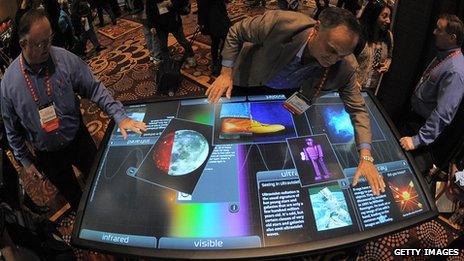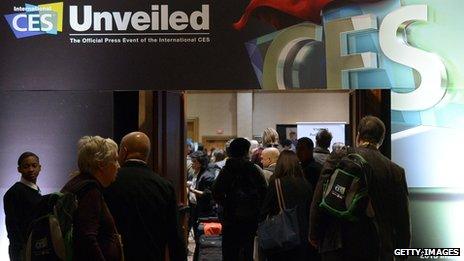CES: The selling starts
- Published
- comments
Some the gadgets on show, including smart cars and TV screens that let viewers watch more than one programme in 3D at the same time
If you don't like capitalism at its most flamboyant and brash, don't come to Las Vegas - especially in the week of CES. Most conversations involve selling you something - and this week that means technology. And the spirit of salesmanship even affects the usually shy Brits who come here.
Whether it was checking in at Gatwick, on my 10 hour flight, or standing in the two hour immigration line at Las Vegas's woefully inefficient McCarran airport, I found myself on the end of a series of pitches. From wireless charging to consumer telematics, from new gaming platforms to a hi-tech smart bicycle, all the ideas pressed upon me by their eager supporters sounded impressive.
But last night at CES Unveiled, a preview event in a vast, noisy hotel ballroom, there were plenty more suitors for the attention of the hordes of technology journalists. LG's 84 inch ultra-high definition television was the most eye-catching product on show - though with no broadcast programmes to show off its capabilities for some while it's unlikely to be in your front room soon.

But all kinds of connected devices were on show which will be making an impact on our lives soon. Many were to do with health - from the pulse monitor you plug into your smartphone, to a fitness monitor, the Fitbug, which sets you exercise goals after monitoring your physical activity. Most bizarre was the smart spoon, which is designed to encourage you to eat more slowly - if you spoon food into your mouth rapidly the spoon handle throbs with a warning signal.
It all chimed with the narrative outlined at a press conference by Shawn DuBravac, the chief economist of the Consumer Electronics Association. He described "an age of algorithms" where connected sensors digitised all kinds of data about an individual's health and daily activities, and then provided them with useful material. One example - taking data from a blood pressure monitor and cross checking it with a user's calendar to find out whether particular meetings caused stress.
For consumers, there will be the promise of benefits if they share their personal data.

One US insurer is offering discounts to drivers who share their GPS data with the company. Lots of privacy issues, of course, but those who choose to cover themselves in sensors or internet connected watches may not worry too much about that.
Amid all this innovation, you might think that the global technology industry was in fine fettle. Not so, according to the Consumer Electronics Association. While sales of smartphones and tablets exploded, the market as a whole actually contracted by 1% in 2012. Even in China, where the new middle class is rushing to buy every gadget imaginable, sales of TVs fell.
For Japanese manufacturers in particular these are stressful times. Sony, Panasonic and Sharp all had a dreadful 2012 - and will be hoping to prove at CES that they can still deliver innovative products in the face of stiff competition from South Korea and China. Perhaps strapping a few of those health sensors to their CEOs might deliver some interesting results by the end of this week.